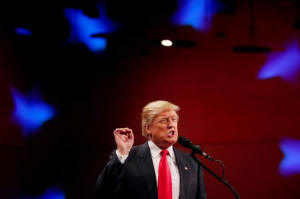|
Trump attack on Lockheed Martin
foreshadows war on defense industry
 Send a link to a friend
Send a link to a friend
 [December 13, 2016]
By Alwyn Scott [December 13, 2016]
By Alwyn Scott
SEATTLE (Reuters) - Donald Trump on Monday
widened his attack on defense contractors, slamming Lockheed Martin
Corp's <LMT.N> F-35 fighter jet program as too expensive as aides to the
president-elect said he intends to keep pushing to cut the costs of
military hardware.
Trump's latest Twitter broadside sent defense shares tumbling and fanned
concerns that the incoming administration will reduce defense
contractors' profit margins and cut broader federal spending,
threatening U.S. factory jobs even as Trump promises to boost
manufacturing employment.
"The F-35 program and cost is out of control," Trump said on Twitter,
echoing campaign promises to cut waste in federal spending. "Billions of
dollars can and will be saved on military (and other) purchases after
January 20th."
Last week, Trump targeted Boeing Co <BA.N> with tweets for "out of
control" costs on new Air Force One planes, urging the federal
government to "Cancel order!"
The new administration's focus is likely to be "wide-reaching and impact
all of government as we look to come up with better deals," Trump
transition spokesman Jason Miller said.
"We're going to look for opportunities to go back through and make sure
that we're not getting taken advantage of."

Trump's F-35 tweet drew support from U.S. Senate Armed Services
Committee Chairman John McCain, who has voiced support for the fighter
jet in the past. While a president cannot cancel a program after funds
have been allocated, it can purchase less.
"He can reduce the buy over time, next year, as we look at it again,"
McCain told Reuters.
But Trump's off-the-cuff remarks bristled others in Congress. Senator
Richard Blumenthal, a Democrat from Connecticut, home to F-35 engine
maker Pratt & Whitney, said the program supports 2,000 Pratt jobs and
thousands more at suppliers.
"The suggestion that costs are out of control is just plain wrong," he
said. Trump should "learn more about the facts" before discussing
"arbitrary cuts in the program,Ē he added. "He's the president-elect.
What he says matters."
Lockheed shares fell 2.5 percent after being down 5.4 percent earlier.
Shares of General Dynamics <GD.N>, Northrop Grumman, BAE and Raytheon
also fell, while United Technologies and Boeing shares were slightly
higher.
'ACQUISITION MALPRACTICE'
The F-35 has been dogged by problems, with the Pentagonís chief arms
buyer once describing as "acquisition malpractice" the decision to
produce jets before completing development.
That led to retrofits and helped escalate costs to an estimated $400
billion, prompting the F-35 to be described as the most expensive weapon
system in history.
[to top of second column] |

President-elect Donald
Trump speaks at the USA Thank You Tour event at the Iowa Events
Center in Des Moines, Iowa, U.S., December 8, 2016. REUTERS/Shannon
Stapleton/File Photo

The Pentagon's chief weapons tester has continued to criticize it,
but the jets are now in use by the U.S. Marine Corps and Air Force,
and by six countries: Australia, Britain, Norway, Italy, the
Netherlands and Israel. Japan took delivery of its first jet last
week, according to a program spokesman.
Australian and Japanese defense officials both said they have no
plans to alter their commitments to the F-35.
"We are very confident that the Joint Strike Fighter is the right
jet for Australia, and for the United States and the rest of the
world," said Christopher Pyne, minister for Australiaís defense
industry.
Australia has ordered 72 F-35s, while Japan has agreed to purchase
42 fighters to replace its aging F-4 fleet.
"We will have to watch Trumpís policies closely when he becomes
president, but at this moment, we have no intention of changing
direction," Japanís Minister of Defense Tomomi Inada said.
Lockheed's F-35 program leader, Jeff Babione, said Monday the
company had invested millions to reduce the jet's price by 60
percent from original estimates. "We project it to be about $85
million in the 2019 or 2020 timeframe," he told reporters in Israel.
The Pentagon is now paying about $102 million each for the
conventional takeoff A-model, according to sources familiar with the
program. The savings reflect larger quantities and the ironing out
of technical issues.
As a practical matter, it was unlikely the U.S. would unwind such a
large program involving contractors in nearly every U.S. state and
eight partner nations, Baird Equity Research analyst Peter Arment
wrote in a note Monday.

"But what is likely ... is the message to the industry of
potentially more risk-sharing on costs," he said. "This is
potentially a new paradigm for the industry."
(Reporting by Alwyn Scott, Andrea Shalal, Patricia Zengerle, Matt
Spetalnick, Jonathan Landay, Phil Stewart, Doina Chiacu, Susan
Heavey, Colin Packham and Nobuhiro Inada; Editing by Bill Trott,
Nick Zieminski and Lincoln Feast)
[© 2016 Thomson Reuters. All rights
reserved.]
Copyright 2016 Reuters. All rights reserved. This material may not be published,
broadcast, rewritten or redistributed. |